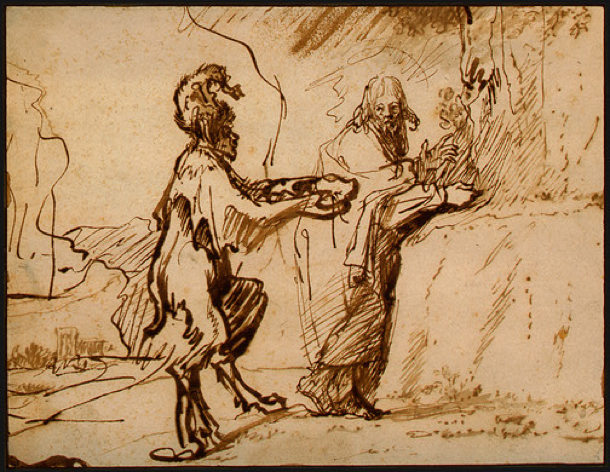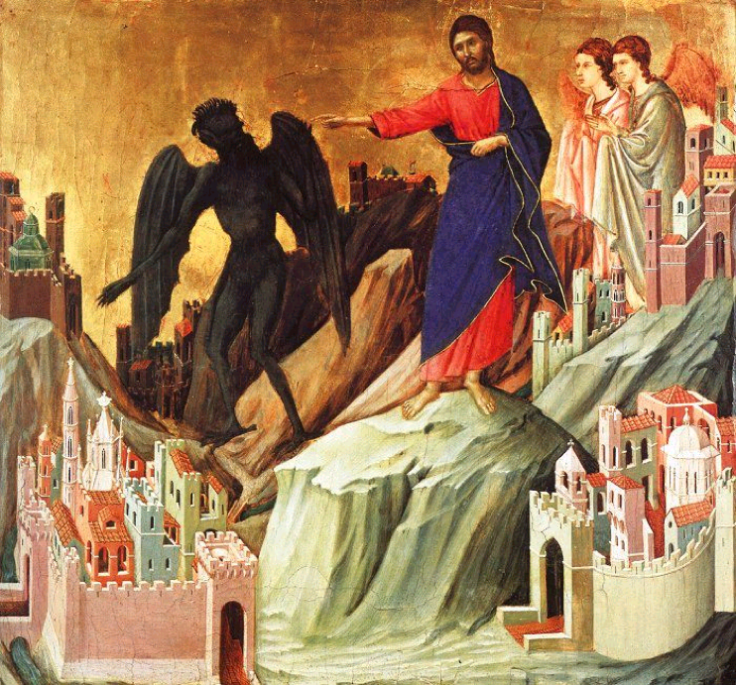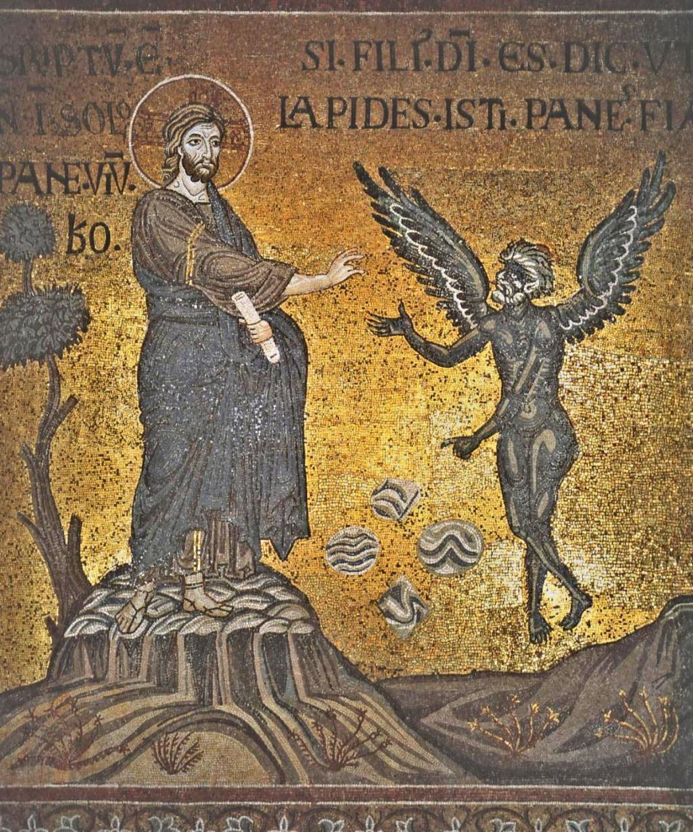Genesis 2:15-17; 3:1-7 – Adam and Eve eat of the tree of the knowledge of good and evil. “On the day that you eat of it, you shall die.”
Psalm 32 – Happy are those whose transgression is covered, whose sin is forgiven.
Romans 5:12-19 – Death exercised dominion from Adam to Moses. Therefore just as one man’s trespass led to condemnation for all, so one man’s act of righteousness leads to justification and life for all.
Matthew 4:1-11 – Jesus’ 40-day fast and the Temptation in the Wilderness
Never succumb to the temptation of bitterness.
– Martin Luther King, Jr.
If you succumb to the temptation of using violence in the struggle, unborn generations will be the recipients of a long and desolate night of bitterness, and your chief legacy to the future will be an endless reign of meaningless chaos.
– Martin Luther King, Jr.
Lead us not into temptation…
– Jesus
God cannot fill what is already full.
– Mother Teresa
By means of a diversion, we can avoid our own company twenty-four hours a day.
— Pascal
Wilderness
Let me begin by saying that the texts appointed for Lent, in this first year of the three-year Revised Common Lectionary cycle, are the ancient texts that were used for the catechumenate. These were the texts that the first centuries of Christians felt were important for newcomers to the faith to study: Nicodemus and being born again, the woman at the well and the water of life, the man born blind and spiritual blindness, and so on. What if every new member class studying and reflected on these texts?
The first Sunday in Lent is always devoted to the temptation of Jesus in the wilderness of the beginning of his ministry. Matthew’s account is the most… organized, perhaps. Temptation is the theme that ties together all of the texts.
We begin with the temptation of Adam and Eve in the garden of Eden. This text reminds me of a bumper sticker I saw the other day that said, “Eve was framed.” A sentiment that appeared on the cover of Life Magazine in 1971.
That might make a great sermon starter. A sermon on this text will likely pick up the funny bone and possibly irk those who wrestle with patriarchy. Temptation leads to the blame game: God questions Adam, who blames Eve. “The woman that Thou gavest me, she gave me the Apple!” And when Eve is questioned, she blames the serpent. Who is to blame when we succumb to temptation? How quick we are to point the finger.

The Adam and Eve story is deeply complex, and widely misunderstood. Adam and Eve are punished for eating from the tree of the knowledge of good and evil, though they don’t yet know the difference between good and evil. The serpent tells them when they eat of the tree, they will know the difference, like God. It turns out to be true. God says the day you eat of it, you will die; the serpent says otherwise. Again, the serpent is right. God is portrayed as jealous. Adam and Eve break out of the innocence of childhood into the dawning adult reality of good and evil and knowledge… Knowing is a word that is loaded in Genesis. “And Adam knew his wife Eve, and she conceived and bore Cain…” Preach this text only with a lot of prep work.
The Romans text picks up on the temptation in the garden of Eden. In his letter to the Romans, call marvels in chapter 7 at his propensity to do the very thing which she hates the most. Sin then, is doing what he hates. Paul claims that all people sin. And this goes back to the very first time sin entered into the world, with the first sinner, Adam. As in Adam, all become sinners. In Christ all are made righteous, apart from works of the law. A sermon on Christ’s revelation of the righteousness of God in Romans would no doubt be a heady sermon.
In the gospel text for this Sunday, we see the humanity of Jesus. Even the Son of God is subject to temptation. We also see him resist temptation, quoting Scripture. Satan quotes scripture as well, of course, so we are not offered any magic pill here. Jesus faces temptation to abandon his God-given earthly mission. The bait is enticing. What is your earthly mission? What temptation stands to derail you from the greater good for which God has called you in your baptism?
Then Jesus was led up by the Spirit into the wilderness to be tempted by the devil. 2He fasted forty days and forty nights, and afterwards he was famished.
— Matthew 4:1-2
In the gospels, Jesus constantly takes time to get away. This is a good model for anyone in ministry. In his book The Power of Pause, Terry Hershey tells a story about the son of a rabbi who goes out into the woods every day after school. The worried rabbi asks his son about it. “No need to worry, dad. I go to the woods to talk with God.” Relieved, the rabbi replies, “As a rabbi’s son you should know that God is the same everywhere.” “Yes,” the son replies, “God is the same everywhere, but I am not.”

We need the wilderness, the place of quiet. Without it we are lost. Yes, we need the place of productivity, the place of reflection makes the place of productivity possible. Without the place of reflection, we are doomed to become ceaseless automatons lost in a flurry of unfocused activity.
After his baptism, Jesus began his ministry with 40 days of prayer and fasting. There is no other way to start a new ministry. How else does one know where to begin? What must be done? We must first discern the voice of God, which means turning off the noise of the world, the noise in our heads. It means learning to listen, as Ann Weems puts it, for the rustle of angels’ wings. Still, the wings we hear may sometimes be those of temptation.
Lenten repose is a challenge for church leaders. Lent is busier than ever. There is less time for reflection, not more. We add on a midweek service with all the planning, recruiting, and sermon prep. Maundy Thursday, Good Friday, Easter Vigil, and Easter Sunday require a lot of work. Some have baptismal preparation, catechumenate, new member sessions, and First Communion classes.

Somehow in the midst of this we must still find time. Where will the extra sermons come from if not from listening to God? How can we model a balanced spiritually-centered life if we become children of hell driven by overzealous schedules? This takes tremendous discipline. We must intentionally thin out our schedules of many things in order to make time for additional worship, preparation, prayer, fasting, almsgiving, and acts of mercy.
Having kids has helped somewhat. Spring Break inevitably falls in the middle of Lent. The kids are off from school. We have to take advantage of this. So, in the midst of the busiest season of the year, I learned to drop everything and just walk away. We go to the beach or visit family – a trip to the zoo, a day in the woods. We just… have to. Or we will lose our center.
The second challenge is timeless, universal. In the wilderness we will most certainly, nearly always, encounter God. Seek and ye shall find. Knock and the door shall be opened. God is faithful. God shows up. But to be honest, we have to admit: We will most certainly, nearly always, also encounter Satan. “So I find it to be a general rule,” Paul says, paraphrased, “that when I’m wanting to do good, evil lies close at hand.”

At every turn it seems we are tempted to set aside God’s agenda for our own. Many minds greater than mine have parsed the Temptation texts over the millennia. Jesus seems to be tempted three times, by three things that are not at all in themselves bad. He’s not tempted to commit murder or genocide. He’s tempted with three things: wealth, safety, and power.
Wealth
“If you are the Son of God, command these stones to become bread.” Nothing wrong with bread right? Jesus teaches his disciples to pray, “give us this day our daily bread.” Bread is necessary for life. Luther says bread is, “Everything that nourishes our body and meets its needs, such as: food, drink, clothing, shoes, house, yard, fields, cattle, money, possessions, a devout spouse, devout children, devout employees, devout and faithful rulers, good government, good weather, peace, health, discipline, honor, good friends, faithful neighbors, and other things like these.”

So what’s wrong with Jesus wanting these things? Absolutely nothing, unless their support supplants his primary mission. The temptation is to make our life about the constant pursuit of more. If you follow Jesus, there will come a time when you are tempted to forget your God-given mission to follow the god of the belly. Jesus teaches, “Don’t worry about your life: what you will eat, drink, or what you will wear. Trust God, who clothes the fields and feeds the birds. Seek first God’s kingdom, and let everything else work itself out.”
Safety
“If you are the Son of God, throw yourself down from here, after all, doesn’t the Bible say, God’s angels will take care of you?” Safety is not a bad thing. But if staying safe becomes the highest good, we will never risk anything. There would be no cross. We may think ships are safest in the harbor, but that’s not what ships are built for. Life is dangerous. None of us are going to get out of it alive. Don’t trade in your mission to cling to safety.
Power
“All the kingdoms of this world I will give to you if you bow down and worship me.” Jesus has been called to a ministry among the people that will eventually require him to lay down his life. The devil tempts Jesus to trade his calling, his destiny, his integrity for POWER.

Like bread and safety, good things, there’s nothing wrong with power. Think of what you could do with political power. You could feed people, make a difference. But if the pursuit of power becomes a greater goal in the ministry to which we are called, we have missed our calling. Jesus accomplishes his mission without holding political office. If we chase power, political or ecclesiastical, we will miss what God can do with our powerlessness. God says, “My power is made perfect in your weakness.” It was not in Jesus’ political or military power that made a difference. It was his love and serving and dying for us. Let us be a servant church.
The wilderness is necessary. It is a place of reflection and healing. But it is also a place of temptation and testing. Expect to have your calling and mission questioned. “Why give your life to this silly religious business? The church is just a petulant club of judgmental moralists. Leave this behind. Go make some bread. Live the high life. Eat and drink for tomorrow we die. Forget your cross. Are you some kind of masochist? Why sacrifice for others? Why be a servant? Why servitude at all? Go for the gusto. Don’t worry about the poor. Didn’t Jesus say the poor will always be with you? You can’t save the world. Live your life.”
Perhaps one of the reasons we fear the wilderness experience is because we know that we will encounter voices of doubt, fear, and temptation, as well as the voices of faith, hope, and love. So Lent and the desert are not without risks. The wilderness is wild. But the alternative is closing our hearts to the spiritual, being left to go on our own strength.
So, welcome to Lent. Pray: empty me, in whatever ways you can. Change my routine. Help me listen. Help me to fast, pray, give, and trust. Help me know that fasting doesn’t make me a better person, right before God, of special merit, but rather it simply clears away the clutter so that we can see and hear God more clearly.
